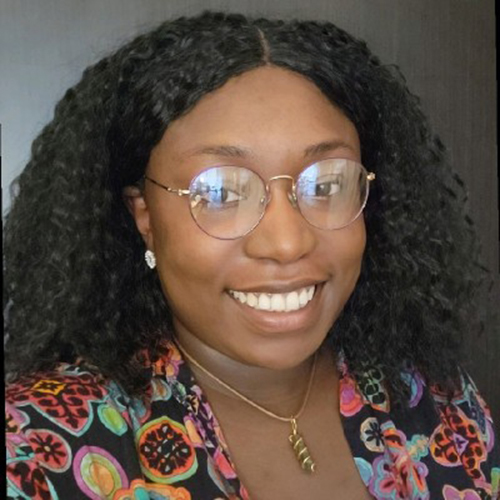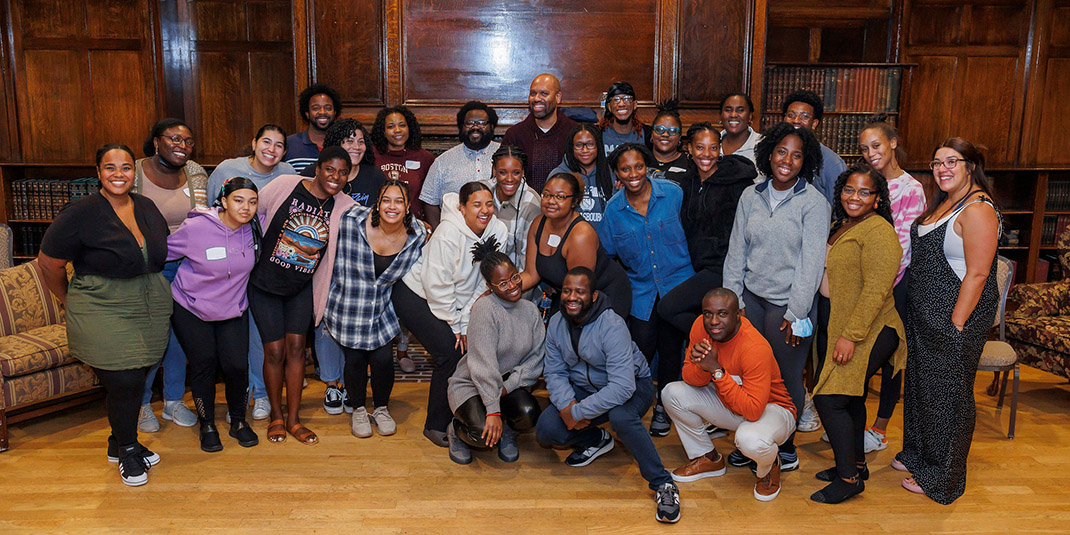
Marcel McClain. Photo by Caitlin Cunningham for BC Photography.
It was 2020, and George Floyd, a Black man, had just been killed by a white police officer in Minneapolis, Minnesota.
His murder had sparked protests against anti-Black racism across the globe and amplified calls to reimagine the way policing works.
At the time, Marcel McClain had been working in civil service in Oakland, California.
McClain, M.S.W.’24, had already earned two degrees—a bachelor’s in political science from the University of Las Vegas-Nevada in 2008 and a master’s in liberal studies from Skidmore College in 2017. But he felt unfulfilled, he recalls, unsure about his professional future, and motivated by Floyd’s murder in police custody to take a more active role in confronting racial injustice.
In short order, McClain discovered the teachings of Resmaa Menakem, a social worker, author, and leading voice on racial trauma. He took two online workshops with the trauma specialist, both focused on Menakem’s concept of Somatic Abolitism, which uses the body and its natural resilience as mechanisms for healing racialized trauma.
McClain had been familiar with somatic therapy, a practice that aims to treat mental and emotional health issues through the connection of mind and body, but it wasn’t until his experience in the virtual seminars that he seriously considered that he might make a good therapist, too—that he could become a healer like Menakem.
“I had received somatic therapy about a decade earlier, and I had long suspected that I was curious about a profession in mental health. But I just never felt like I had resolved enough to make the jump until these seminars with Menakem,” he says. “I was inspired, I wanted to replicate what he was doing, and so I decided to pursue social work myself.”
McClain chose the Boston College School of Social Work to be part of the School’s Black Leadership Initiative, a cohort-based program that prepares students to tackle complex social challenges in Black communities.
As part of the program, he took courses that centered the African Diaspora, provided therapy to Black and Latinx clients at Fathers’ UpLift, the first mental health and substance use treatment facility for fathers and families in the U.S., and received nuggets of wisdom from faculty and peers alike that have shaped his professional philosophy as a therapist at a 129-year-old nonprofit organization.
“Having a tight cohort of classmates with similar backgrounds made all the difference in feeling like I was part of a community at BC versus searching for people I can connect with meaningfully,” he says. “That community was the ground off of which I felt I could build my social work practice and to which I could return when I need guidance and reassurance.”
Today, McClain serves as a clinical social worker at the Massachusetts chapter of Volunteers of America, a nonprofit organization founded in 1896 that provides affordable housing, treatment for substance use disorders, and other assistance to people in need.
We asked him to reflect on his time at BCSSW, with a particular focus on how his experience has molded his career trajectory.
What role did the BLI play in your decision to choose BC?
The BLI was central to my decision. I had never had the kind of cohort experience that the BLI promised, and none of the offers I received from other schools could match the draw of what the BLI could provide.
BCSSW had also just created the Afrocentric Social Work field of practice, now called BLI Social Work, and I was curious about how to think about social work from a non-Western lens.
How would you describe your experience in the BLI?
We had a tightly knit cohort, and I was able to build a lot of close relationships with my peers. Most of the people I’ve remained friends with since graduating in May have been those I went through the BLI with.
I also received a lot of good advice from the faculty. Social workers often deal with fatigue and burnout within a couple of years of entering the profession, and my professors reinforced the need for rest and self-care as forms of resistance, self-advocacy, and self-sustainability. I think about that a lot, and I’m not sure I would have received that advice outside of the BLI.
I’m not trying to be a revolutionary in the social work field for the sake of it, but I’ve also learned that progress isn’t made by accepting the status quo—and I’m trying to apply that idea to my work at Volunteers of America.
What role do you play at Volunteers of America?
I’m currently working in a group home for men with substance use and addiction. I also provide emotional and programmatic support to eight of the 24 residents there. I meet with them weekly, for one on one clinical support, and keep their activities aligned with their goals.
Do you apply any ideas or concepts that you learned in the BLI to your work at Volunteers of America?
Afrofuturism is a concept that Professor Sam Bradley focused on and that I have begun to consider in my day-to-day work. That is: How do we take stock of where we are now so that we can predict where we might be going in the future? And so how can we think strategically around that to position ourselves to help our clients achieve optimal well-being?
I’m also trying to take a person-centred approach to my work—a concept that was discussed at length in the Afrocentric Organizations and History of Activism in Black Communities courses that I took as part of my experience in the BLI.
I’ve found myself advocating for clients that might not be adhering perfectly to the program requirements and thinking first and foremost about what might happen to them if they were to leave here unprepared. I believe I have a mandate to seek the best outcomes for the people I’m charged with caring for. I’m working from a framework of not pathologizing my clients, but rather seeing them as humans first with a focus on how social conditions have affected their individual psyches.
All members of the BLI do internships that serve the Black community. You provided therapy to Black and Latinx clients at Fathers’ UpLift, the first mental health and substance use treatment facility for fathers and families in the U.S. What was the highlight of that experience for you?
I got to sit in on a group that served men who had been formerly incarcerated. I learned a lot about what people who have faced incarceration endure in terms of trust in the community, stature in the community, and how they have to readjust their own psyches in order to remain in the community and avoid re-criminalization. And I also got a close loook at how the criminal justice system impacts their families and sets them on a different course for the rest of their lives.
How have the values of BLI Social Work—namely community, collective action, and well-being in socio-cultural contexts—informed your approach as a social worker today?
The principles of collective work and responsibility have really made me consider how I can embed my work into my community. I haven't figured that out yet, but it’s something that guides my thinking about my potential career paths. For the time being, I’m trying to learn a bit more about the group side of mental health, not just because of its ability to reach more people, but also because of its focus on building communities that are self-sustaining.
What advice do you have for prospective students considering the BLI?
Embrace the cohort model. I ended up building a kind of network with my peers, where we would text each other and rely on each other for getting through a very demanding program.
The BLI is also unique—there’s nothing quite like it at other social work schools across the country—and you’ll have access to a lot of great thinkers and experts in their field. They are more than willing to support you in any way that they can, so take advantage of that as much as possible.




